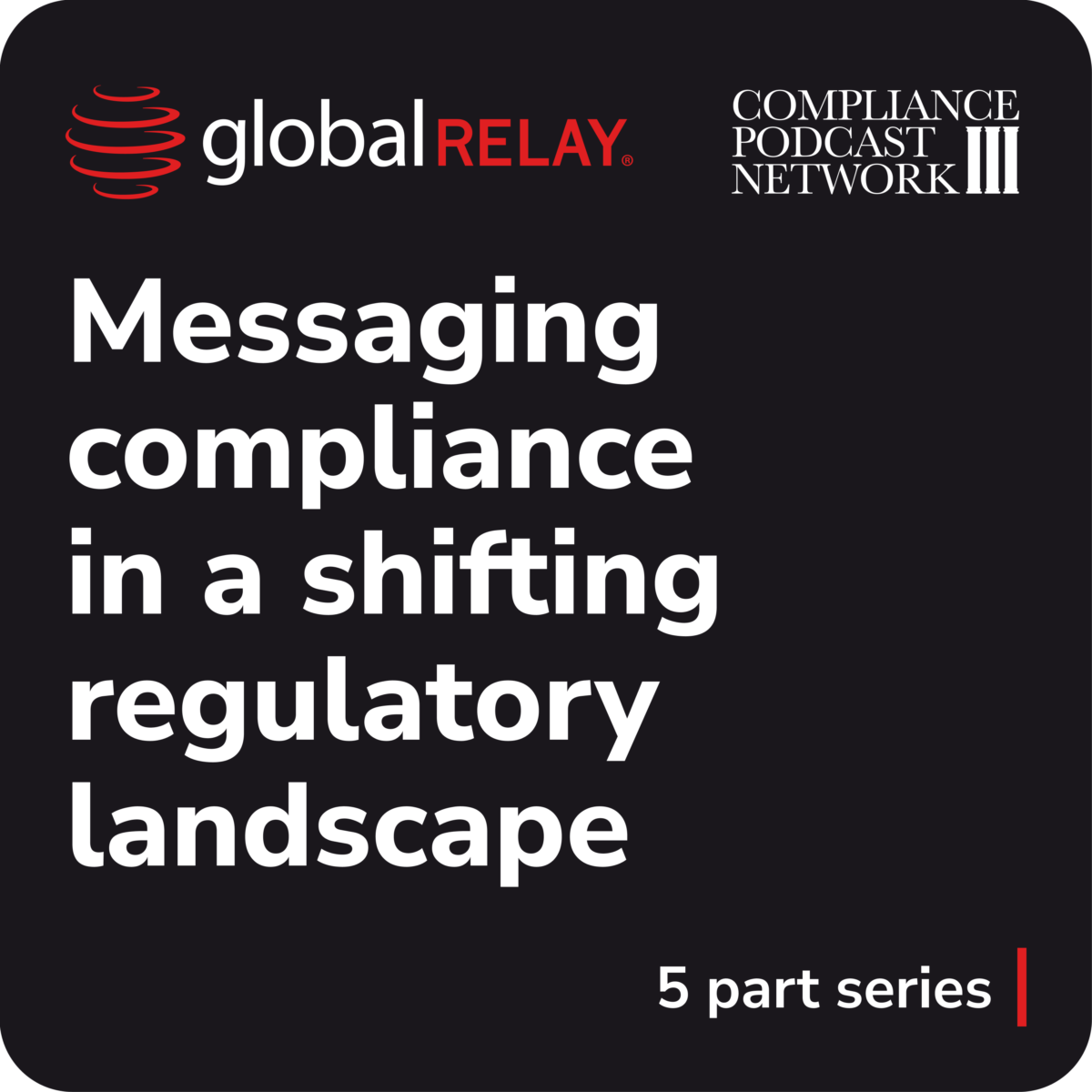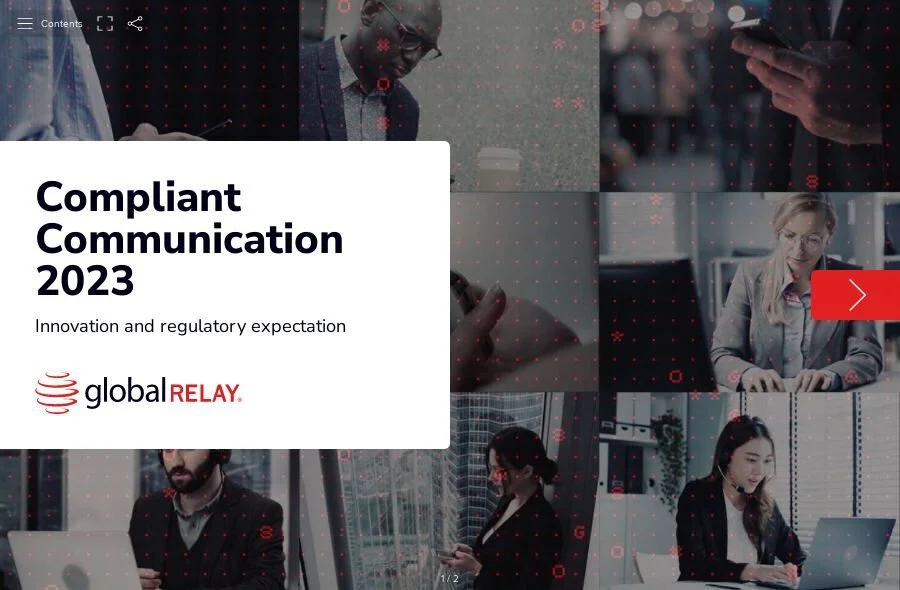Are you ready to learn how to implement electronic communications capture and supervision in your firm for better compliance and prevention of regulatory violations? Is messaging compliance giving your compliance function headaches. Welcome to a special 5 part blog post series on messaging compliance in a shifting regulatory landscape, sponsored by Global Relay. For this Part 5, I visited with Jennie Clark about the recently released Global Relay report, Compliant Communications in 2023.
With the report indicating that 59% of respondents have banned messaging applications such as WhatsApp and WeChat, it’s evident that businesses need to find better solutions. There is significant challenge of senior managers’ compliance and the need for regulators to apply more accountability to individuals. What are the key challenges for compliance professionals?
As regulatory agencies across the globe continue to crack down on non-compliant firms, the role of UK regulators cannot be understated. UK regulators have joined forces with their US counterparts, ensuring that businesses adhere to the required compliance standards. Jennie Clark mentioned the recent events surrounding regulatory fines and penalties, where total fines issued within a month exceeded $2 billion. She noted that UK regulators’ active involvement in addressing non-compliance is indicative of the importance of understanding and adjusting to these shifting regulatory landscapes.
Navigating modern communication channels presents numerous compliance challenges. These include managing communications across various messaging applications while avoiding the risks of non-compliant information exchange. In turn, compliance officers are responsible for ensuring businesses remain within regulatory requirements to avoid costly penalties. The report found the ongoing struggle businesses face in terms of addressing their compliance concerns.
As a compliance officer, ensuring that your organization’s messaging apps are in line with industry regulations is vital to your professional success and your company’s reputation. In this blog, we discuss the importance of evaluating current compliance practices, developing targeted educational programs, implementing corporate phone policies, and staying updated on regulatory changes. By following these steps, you can confidently navigate the complexities of messaging apps compliance and maintain a compliant and efficient communication environment. Listen to our podcast to gain expert insights and practical tips for overcoming these challenges.
Here are the key steps:
- Evaluate current messaging app compliance practices
- Develop targeted educational programs for staff
- Consider adopting advanced technology solutions
1. Evaluate current messaging app compliance practices.
As the digital landscape continues to evolve, compliance officers are faced with the challenge of managing messaging apps in a way that adheres to regulatory guidelines. One critical step in this process is to evaluate the current messaging app compliance practices to find areas for improvement. With the rise of platforms like WhatsApp, WeChat, and other messaging applications, businesses have struggled to find the appropriate balance between enabling effective communication and ensuring compliance. By thoroughly assessing current practices, organizations can determine which applications should be allowed, and how to monitor the content exchanged through these platforms.
With a majority of the respondents stating that they have prohibited the use of WhatsApp, WeChat, and other messaging applications in their organizations, it is apparent that establishing a compliant communication process is of utmost importance. Jeannie also emphasized the need for educating employees on the consequences of non-compliance and recognizing the benefits of adopting technological solutions and corporate phone policies as alternatives. The significance of this key step in evaluating messaging app compliance practices cannot be overstated. As regulatory fines and penalties continue to increase, it is essential for organizations to prioritize compliance and avoid financial setbacks. Beyond financial consequences, ensuring compliant communication channels also safeguards an organization’s reputation, while fostering trust with regulatory bodies. Moreover, understanding the urgency of this issue and adapting accordingly enables businesses to make the best use of available opportunities.
2. Develop targeted educational programs for staff.
To tackle this challenge, it is essential for businesses to develop targeted educational programs for staff members, ensuring that they are well-versed with the rules and guidelines pertaining to each messaging platform being used within the organization. A structured approach to educating employees can not only mitigate the risks associated with non-compliant messaging but also foster a culture of accountability throughout the company. The report noted the significance of contextualizing the consequences of non-compliance with communication channels. This calls for tailored training sessions that address the specific challenges faced by employees using different messaging apps, and the potential ramifications of non-compliant communication on the firm’s overall reputation and regulatory standing.
By leveraging real-world scenarios and relatable examples, businesses can educate their staff in a more engaging and effective manner, ensuring that they not only understand the rules but also the underlying reasons for their existence. The importance of targeted educational programs for staff members cannot be overstated in the current regulatory environment that sees businesses grappling with unprecedented levels of scrutiny and enforcement actions. It is crucial for companies to invest in proactive measures aimed at reducing the likelihood of non-compliant communications. Implementing educational programs and raising awareness among employees is a key step that not only empowers them with the necessary knowledge but also underscores the organization’s commitment to upholding compliance standards. By doing so, businesses can minimize potential risks, safeguard their reputation and ultimately, create a robust foundation for long-term success in an increasingly regulated world.
3. Consider adopting advanced technology solutions.
Managing compliance in the rapidly changing world of communication platforms can be challenging, especially for companies that rely on popular messaging apps for business communications. Industry experts increasingly recommend adopting advanced technology solutions to help address these challenges. Implementing the latest technological tools in the compliance process can provide businesses with greater control and oversight of their communications while helping prevent non-compliant behavior and fostering a culture of accountability and transparency.
Advanced technology solutions could be leveraged to streamline the compliance process. The deploying robust tools and systems that can effectively manage and monitor the myriad of communication platforms employees use in their day-to-day work is critical. This may include utilizing cutting-edge technology such as AI-driven monitoring, advanced search capabilities, and data analysis to identify and mitigate potential compliance risks. By embracing these advanced solutions, compliance officers can focus on more strategic tasks while ensuring their organization stays compliant with the latest regulatory requirements and industry best practices.
The key step of considering and adopting advanced technology solutions cannot be overstated for compliance officers seeking to manage messaging app compliance. Modern technology has the potential to dramatically enhance a compliance officer’s ability to monitor communications, automate routine tasks, and identify potential concerns. Not only does this result in increased efficiency and effectiveness of compliance programs, but it also helps reduce the likelihood of costly fines and penalties due to non-compliant communications. As the landscape of communication platforms continues to evolve, companies that stay on top of emerging technology trends and harness the power of advanced tools will be better positioned to navigate the complexities of compliant communications and maintain a proactive approach to regulatory compliance.
In today’s fast-paced business environment, staying on top of messaging app compliance is crucial for compliance officers, as this can help them overcome the challenges they face daily. By evaluating their current practices, developing educational programs for staff, adopting advanced technology solutions, implementing corporate phone policies, and monitoring regulatory updates, they can effectively maintain a compliant communication system. So, take these steps to heart and embrace the opportunities they present in ensuring a more secure and compliant future for your organization.
To obtain a copy of the Insights Report, Compliance Communications 2023, click here.











